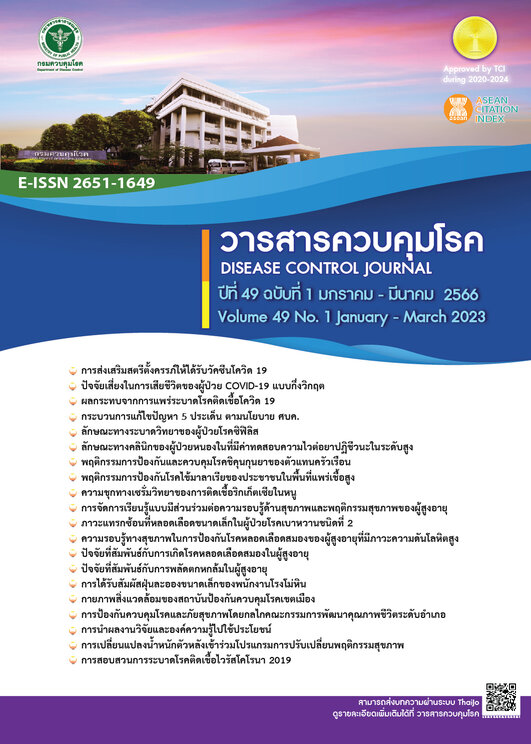Evaluation of utilization of research and knowledge of the Department of Disease Control, 2014-2016
DOI:
https://doi.org/10.14456/dcj.2023.18Keywords:
evaluation, research utilization, knowledge utilization, Department of Disease Control, evaluation researchAbstract
This research was a cross-sectional study which applied the logic model to evaluate research and knowledge utilization in the years 2014-2016 for the Department of Disease Control (DDC), Thailand. The objectives were to evaluate the situation problems and factors affecting research and knowledge utilization of DDC from August 20th, 2018 to September 6th, 2018. By purposive sampling, 51 principal investigators (PI) and 102 knowledge creators were recruited and interviewed using a questionnaire. Descriptive statistics and inferential statistics were used for data analysis. The results reveal that 35 research studies were used or applied further and 53.7% of them were used in academic purposes. Regarding the characteristics of PIs, most of them were 50 years and above, have master’s degree, had working experience in DDC 11-15 years and had 5-10 articles in the past. For 95 knowledge articles, most of them were abstract or tacit knowledge, 55.4% of them were used within the organizations such as human resource section. Characteristics of the knowledge creators, they were 50 years and above, have bachelor’s degree and had less than 5 articles in the past. Factors related to the utilization of research studies at the 95% statistically significance were namely academic position level and utilization plan, and factor associated with utilization of knowledges were reported as experiences for building knowledge, reports in the past, motivation of self- development, and utilization’s plan. In addition to supporting academic papers, DDC lacks the support for academic presentation abroad. Changing often the person responsible, DDC should encourage mentors who have substantial academic experience to advise and suggest new officers to do work together, as well as support and encourage academic work utilization into regulations, guidelines, and policies for solving the problems regarding illness and mortality of people in the country.
Downloads
References
Plipat T, Siripanumas P. Twenty-Year National Strategic Plan for Prevention and Control (B.E. 2561-2580). 1st ed. Bangkok: Aksorn graphic and design Publishing; 2017.
Sukprasert M. Annual Report 2018 [Internet]. Nonthaburi; 2018 [cited 2018 Apr 30]. Available from: https://ddc.moph.go.th/uploads/ckeditor/d3d9446802a44259755d38e6d163e820/files/Annual Report 2018.pdf (in Thai)
Hanshaoworakul W, Katakot P, Maenpuen A, Thammasornbunma W. Evaluation Researched Project 2007-2009, Department of Disease Control. Nonthaburi; Institute of Reseasrch, Knowledge Management and Standaras for Disease Control: 2010.
Phuangkamnerd S, Nilsook P. The development of knowledge management system for local wisdom invention preservation. The 6th BENJAMITRA Network National & International Conference on Local Wisdom and Sustainable Development; 2016 May 26; The Far Eastern University, Chiangmai, Thailand. Chiangmai: The Far Eastern University: 2016. (in Thai)
Pungposop N. Research Excellence of National Award-Winning Researchers: Characteristics, Definition and the Key Success Factors. J Soc Dev. 2020;22(1):100–22. (in Thai)
Katakot P. Research utilization of the Department of Disease Control, during 2014-2016. Dis Control J. 2016;46(3):323–35. (in Thai)
W.K. Kellogg Foundation. Logic Model Development Guide [Internet]. W.K. Kellogg Foundation 2004. [cited 2018 Apr 30]. p. 71. Available from: https://wkkf.issuelab.org/resource/logic-model-development-guide.html
Office of the Royal Thai Council. knowledge [Internet]. Bangkok [cited 2022 Oct 16]. Available from: https://dictionary.orst.go.th/index.php (in Thai)
Planning Division, Department of Disease Control. 5-Year Strategic Government Action Plan (2017-2021), Department of Disease Control, 2018. Planning Division D of DC, editor. Nonthaburi; Planning Division: 2017. 344 p.
National Research Council of Thailand. Utilization of research [Internet]. 2018 [cited 2018 Feb 7]. Available from: http://i4biz.nrct.go.th/ewt_news.php?nid=34
Division of strategy and planning, Department of Disease Control. Guidelines for disease prevention and control for the area 2019 under the 20-year development plan for disease prevention and health hazard (2018-2037) [Internet]. Nonthaburi; 2561 [cited 2020 May 8]. 400 p. Available from: https://waa.inter.nstda.or.th/stks/pub/2017/20171117-MinistryofPublicHealth.pdf (in Thai)
International Health Policy Program Foundation. Disability adjusted life years [Internet]. Nonthaburi; 2017 [cited 2019 Dec 13]. Available from: http://bodthai.net/download/รายงานภาระโรคและการบาด/ (in Thai)
Research and Innovation Policy and Strategy Subcommittee. (Draft) Twenty-Year Research and Innovation Strategy (2017-2036) [Internet]. Bangkok. COCOON & C; 2017 [cited 2018 Apr 30]. 152 p. Available from: http://www.nrct.go.th/portals/0/downloads/ร่าง-ยุทธศาสตร์การวิจัยและนวัตกรรม20ปี60-79.pdf (in Thai)
Janjamlha T. Causal model of the research utilization among university lecturers, [Internet]. Bangkok. 2011 [cited 2020 Apr 29]. Available from: http://elibrary.trf.or.th/download_fullstep1.asp (in Thai)
Bumrungyart U. Research synthesis or creative work and presentation of research results to use for the benefit of the Faculty of Humanities and Social Sciences [Internet]. KhonKaen. 2014 [cited 2018 Feb 5]. Available from: http://www.huso.kku.ac.th/thai/researching/data/search_dev.pdf (in Thai)
Poonchareon L. The Guidelines for Research Published in the Journal of Faculty and Researchers in Sukhothai Thammathirat Open University. Electron J Open Distance Innov Learn [Internet]. 2015 [cited 2020 Apr 20];5(2):33–46. Available from: https://e-jodil.stou.ac.th/filejodil/11_3_500.pdf (in Thai)
Chaikongkiat P, Kumkong M. Routine to Research: Driving to Utilization. South Coll Netw J Nurs Public Heal. 20134(3):259-70.
Tippakoon P. Factors influencing research utilization by Thai governmental agencies. Srinakharinwirot Res Dev (Journal Humanit Soc Sci). 2018;11(21):102–22.
Srisasalak J. Synthesis of intelligence [Internet]. Nonthaburi. 2010 [cited 2018 Apr 14]. 316 p. Available from: http://km.fsh.mi.th/wp-content/uploads/2012/07/สังเคราะฟ์ปัญญาเพื่อพัฒนา-R2R-ปี-2553-5.pdf (in Thai)
Department of Reproductive Health and Research. Suggested Actions From Case-Studies of Sexual and Reproductive Health Research [Internet]. Geneva. 2006 [cited 2020 Apr 20]. 101 p. Available from: https://apps.who.int/iris/bitstream/handle/10665/43572/9241594837_eng.pdf?sequence=1
Chaichuay P. Factors influencing utilization of the research results by the personnel and the students of the academic affairs institutes’ networks of the public health and medical technology. Srinakharinwirot Academic Journal of Education [Internet]. 2015 [cited 2018 Feb 5];16(1):136–46. Available from: http://ejournals.swu.ac.th/index.php/jedu/article/view/6674/6296
Almeida C, Báscolo E. Use of research results in policy decision-making, formulation, and implementation: a review of the literature. Cad Saúde Pública Rio de Janeiro [Internet]. 2006 [cited 2018 Feb 5];22:S7-19. Available from: http://www.scielosp.org/pdf/csp/v22s0/02.pdf
Downloads
Published
How to Cite
Issue
Section
License
Copyright (c) 2023 Disease Control Journal

This work is licensed under a Creative Commons Attribution-NonCommercial-NoDerivatives 4.0 International License.
Articles published in the Disease Control Journal are considered as academic work, research or analysis of the personal opinion of the authors, not the opinion of the Thailand Department of Disease Control or editorial team. The authors must be responsible for their articles.






